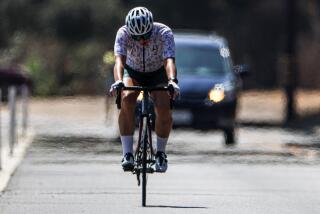A rotating panel of experts from the worlds of philosophy, psychology and religion offer their perspective on the dilemmas that come with living in Southern California.
- Share via
Today’s question: Are pleas for people to conserve energy during heat waves rather pointless in Southern California where utilities say they can handle the load? Some consumers say they are willing to pay high rates for air-conditioned comfort and are unwilling to use electrical appliances at inconvenient times. Specifically, when no urgency is attached to conservation pleas, do you see nevertheless any ethical or spiritual value in lowering personal comfort and convenience?
Father Thomas P. Rausch
Professor and chair of theological studies, Loyola Marymount University
In our individualistic culture, the traditional notion of the “common good,” the principle that the good of each person is intrinsically linked to the good of the community, has too often been forgotten. How many are even familiar with the term? When power grids are overloaded, threatening paralyzing blackouts, a sense for the common good should move us to some sacrifice of personal comfort and convenience. Without personal investment and even sacrifice, community is impossible. But not everyone can make the same sacrifices. Extreme heat can be life-threatening for the elderly and infirm. They have special needs and should be able to use air-conditioning.
The Rev. Ignacio Castuera
Pastor, North Glendale United Methodist Church
The major religious traditions have understood the intrinsic spiritual value of disciplines such as fasting and abstinence that enhance the spiritual life through personal sacrifice. These disciplines were also connected to the well-being of the vulnerable by Israelite prophets and by Christianity. “Energy fasts” can become today’s equivalent of religious practices that impose a certain amount of physical stress to the benefit of the spirit and the common good. All major religions also created groups of believers that adopted daily disciplines of sacrifice and discomfort. Modern equivalents need also to spring up, whether in convent-like settings or through personal pledges to live simply so that the spirit might be enhanced and that others may simply live.
The Rev. Michael Mata
Director, Urban Leadership Institute, School of Theology at Claremont, and associate pastor, Los Angeles First Church of the Nazarene
Sufficient energy for our region belies the true environmental crisis that our world faces today. On a global scale, there is ample evidence that we have already spent our children’s physical future. In such a world, the discipline of conservation is only part of the solution. A rational and ethical approach must include new thinking about nature’s resources. Only then can Earth keep thriving and sustaining life. Conserving energy and beating the heat may affect temporarily our immediate physical comfort level. But with new solutions we can experience a sense of abiding inner comfort knowing that our children and their children’s children, as well as our global neighbors’ children, will enjoy nature’s resources as we do today.


